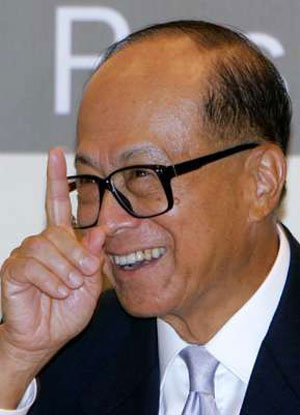Li Ka-shing, 78, will bequeathe at least a third of his fortune - which is
estimated at $18.8bn and rising fast - to his eponymous charitable foundation,
as Asia's richest man follows in the footsteps of his American peers Bill Gates
and Warren Buffett.

Li Ka-shing who Fortune magazine says is the
world's 10th richest person worth $18.8 billion will bequeathe at least a
third of his fortune. [File] |
"The [Li Ka-Shing] Foundation is my third son. Its size will not be less than
one-third of my fortune," Mr. Li, a widower with two sons, said on Thursday at a
results briefing for his two corporate flagships, Cheung Kong Holdings and
Hutchison Whampoa.
Ports and telecoms operator Hutchison Whampoa doubled its earnings for the
first six months of the year, to US$2.4 billion.
"The foundation is set up for charitable work and none of my family members
or the Foundation boards are authorized to spend the funds. " the Asian typhoon
said at the briefing.
Li, sometimes called "Superman" by the Chinese-language press, has built the
reputation of being a canny investor. Li became a tycoon by buying Hong Kong
real estate in 1967 when riots tied to Cultural Revolution caused land prices to
collapse.
According to Li, 90 percent of the funds will invest in Hong Kong and the
mainland though that he had donated his wealth to overseas organizations.
Commenting on his Foundation's operations, Li says that he is not satisfied
to donate cash by will. "No matter 20 million dollars, 50 million dollars or 100
million dollars, I will give them as long as the foundation is helpful. "Even
though 1,000 million, I will not hesitate."
Li who Fortune magazine says is the world's 10th richest person follows the
trend of several world's richest persons who dedicate themselves to charitable
work.
Bill Gates and Warren Buffett pledge to give away a substantial portion of
their wealth. Buffett in June pledged $30.7 billion, over many years, to the
Bill and Melinda Gates Foundation, the largest charitable commitment in history,
according to the Chronicle of Philanthropy.
Li Ka-shing said he has no plans to retire.
"I am healthy so that I will not quit," says Li, adding that one day if he
would not be that smart, he would continue to contribute to the foundation and
charitable work instead of retirement.
After arriving in Hong Kong as a refugee from the mainland at age 13, Li
swept factory floors to survive during the Japanese occupation of the city in
1942-45. After the war, he opened a plastic flower factory and then began buying
real estate.
Among his other successes was a $30 million investment in 1988 with Procter
& Gamble Co. to sell shampoo and toothpaste in mainland. He sold his stake
in the venture for $2 billion in 2004. In 1999, he made a $15 billion gain
selling his Orange mobile-phone unit in the U.K. to Germany's Mannesmann AG.